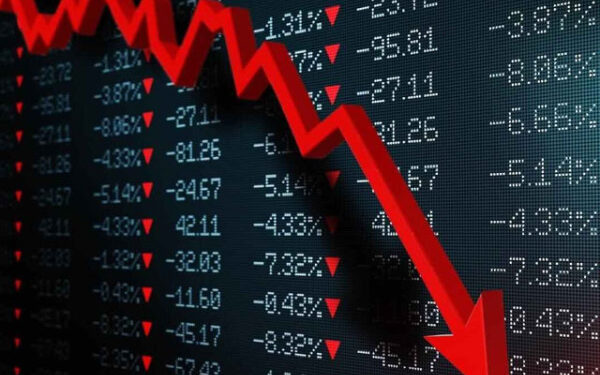Karachi — The Pakistan Stock Exchange (PSX) witnessed a dramatic and sharp decline on Friday, triggering panic among investors and prompting the activation of market-wide circuit breakers. The trading halt and cancellation of outstanding trades reflect the magnitude of the crisis, which comes amid global economic tensions fueled by newly imposed tariffs by the United States under President Donald Trump’s administration.
A Day of Market Chaos: PSX in Freefall
Trading activity at the Pakistan Stock Exchange opened with a downward trajectory as investor sentiment remained bearish. The KSE-100 Index, a key benchmark for the performance of Pakistan’s equity market, fell by 3,331.22 points soon after the market opened, taking the index to a level of 115,460 points.
However, the bearish momentum did not stop there. Continued sell-offs and lack of buyer confidence drove the index further down, plunging by 6,287 points to reach 112,504 points. This triggered the market’s lower circuit breaker, a safety mechanism designed to curb panic-selling during extreme volatility, leading to an immediate suspension of trading activities.
Circuit Breaker Mechanism Activated
The Pakistan Stock Exchange invoked the lower circuit breaker after a 5% drop was recorded in the PSX 45 Index, another key indicator of market performance. As a result, trading was halted for 46 minutes across all equity and equity-based markets.
Following this brief suspension, trading resumed, but the bearish trend persisted. The KSE-100 Index eventually settled at 111,056.89 points, marking a staggering overall decline of 7,734.77 points in a single trading session. This is one of the steepest single-day declines recorded in recent PSX history.
Outstanding Trades Cancelled
In a move to maintain market order and prevent further financial damage, the Pakistan Stock Exchange announced the cancellation of all outstanding trades that were placed before the trading halt was implemented. The cancellation was deemed necessary due to extreme price volatility and to protect investors from unfavorable transactions that might have been executed during market panic.
According to a PSX announcement, the suspension and cancellation procedures were in line with the exchange’s risk management protocols, ensuring fair and orderly functioning of the capital markets even under stress.
Global Factors Behind Market Decline
The dramatic fall in the PSX did not occur in isolation. The global financial markets have been rattled by the U.S. administration’s recent economic policies, particularly the imposition of new tariffs on a range of countries. President Donald Trump’s announcement of increased trade tariffs has sparked fears of an impending global trade war, sending shockwaves across financial markets.
Impact on U.S. and Global Markets
In the United States, stock indices have seen sharp sell-offs, with investors reportedly losing a staggering $60 trillion in just two days. This massive decline in market capitalization reflects widespread concern over geopolitical tensions, economic slowdown, and potential retaliatory measures from affected countries.
Regional Spillover: Gulf and Asian Markets React
The ripple effects of the U.S. policy decisions are being felt far beyond its borders. Gulf markets have also entered bearish territory, with Saudi Arabia’s stock exchange experiencing a loss of 500 billion riyals. Other Gulf Cooperation Council (GCC) markets such as Bahrain, Qatar, Oman (Muscat), and Kuwait are also witnessing sustained negative trends.
Similarly, Asian markets, including those in China, Japan, India, and Southeast Asia, are experiencing heightened volatility. Investors are pulling out capital amid fears of reduced global trade, rising inflation, and unpredictable monetary policies by central banks.
Investor Sentiment and Domestic Factors
While international developments are the primary cause behind the latest market crash, domestic challenges in Pakistan have also contributed to the negative sentiment. These include:
- Macroeconomic Uncertainty: Persistent concerns about Pakistan’s foreign exchange reserves, fiscal deficits, and inflationary pressure have made investors wary.
- Political Instability: Ongoing political uncertainty and government transitions often lead to risk aversion in equity markets.
- Policy Ambiguity: Lack of clarity on government reforms, taxation, and economic growth strategies continues to weigh on investor confidence.
These factors have collectively created a climate of fear and hesitation, prompting mass sell-offs in an already fragile market environment.
Economic Experts Weigh In
Financial analysts and economists are warning that unless proactive measures are taken, further erosion of investor confidence could ensue. According to Dr. Shahid Ali, an economic policy expert, “Pakistan’s stock market is highly sensitive to global movements. However, without a strong internal economic buffer, any external shock will have multiplied consequences.”
He further emphasized the need for the State Bank of Pakistan and the Ministry of Finance to coordinate closely and implement stabilization measures, including interest rate management and investor confidence-building initiatives.
What Lies Ahead for the PSX?
With the global financial landscape facing unprecedented instability, market analysts expect the PSX to remain volatile in the short term. Much depends on how the international community responds to U.S. trade policies and whether diplomatic negotiations ease the tensions.
Locally, the government and the Securities and Exchange Commission of Pakistan (SECP) are expected to monitor the situation closely. Any further economic missteps or lack of investor support mechanisms could deepen the crisis.
Steps Investors Can Take
Financial advisors are recommending that investors:
- Avoid panic-selling and instead assess long-term fundamentals.
- Diversify portfolios to mitigate risk exposure.
- Stay updated on economic policies and international developments.
- Consult with certified financial professionals before making significant investment decisions.
Conclusion: A Wake-Up Call for Market Reforms
The sharp decline of the Pakistan Stock Exchange is not just a reflection of global turmoil but also highlights the vulnerabilities within Pakistan’s financial ecosystem. While circuit breakers and trade cancellations serve as short-term measures to prevent collapse, long-term resilience requires deep structural reforms, improved economic governance, and enhanced investor protections.
As the PSX continues to navigate this turbulent period, stakeholders must work collaboratively to restore stability, attract foreign investment, and reinforce market confidence. The recent plunge should serve as a wake-up call to policymakers and market participants alike, urging them to build a more robust and shock-absorbent financial system.

























